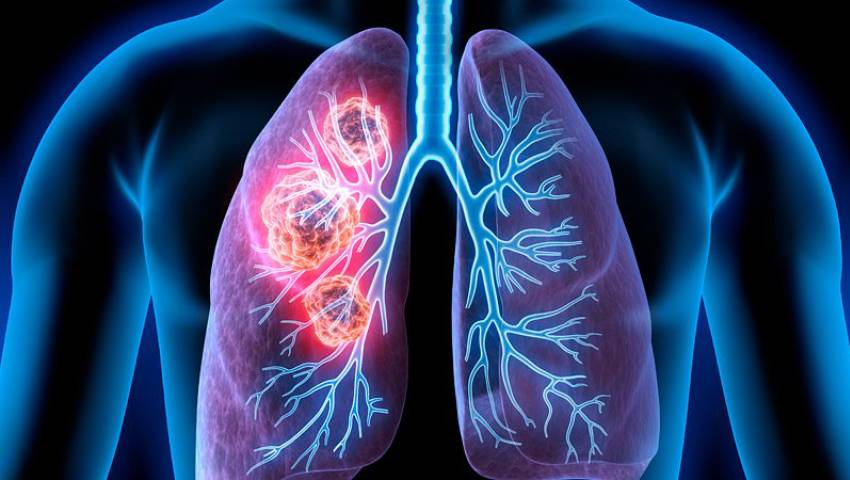
- 12/08/2024
- Dr. Pratik Patil
- 0 Comments
- Blog
9 Early Warning Signs of Non-Small Cell Lung Cancer You Shouldn’t Ignore
Lung cancer remains one of the most common and serious types of cancer worldwide, Non-Small Cell Lung Cancer (NSCLC) is one of the most prevalent subtypes of lung cancer, accounting for about 85% of all lung cancer cases. Early detection significantly improves the chances of successful treatment and survival. Dr. Pratik Patil, a renowned cancer specialist in Pune, emphasizes the importance of recognizing the early warning signs of NSCLC. In this blog, we will discuss the symptoms you shouldn’t ignore and why early diagnosis is crucial.
Understanding Non-Small Cell Lung Cancer:
NSCLC originates in the epithelial cells that line the lungs’ airways and tissues. There are several subtypes of non-small cell lung cancer (NSCLC), including adenocarcinoma, squamous cell carcinoma, and large cell carcinoma. Each subtype has distinct characteristics, but they share common symptoms that can serve as early warning signs.
9 Early Warning Signs You Shouldn't Ignore:
- Persistent Cough: A persistent cough is one of the most typical warning symptoms of non-small cell lung cancer (NSCLC). Dr. Pratik Patil recommends that if your cough stays more than eight weeks, you consult a doctor for a better complete evaluation.
- Chest Pain: Chest discomfort that is persistent or worsens with deep breathing, coughing, or laughing can be an earlier sign of NSCLC. This discomfort might be localized to one area or spread across the chest.
- Shortness of Breath: Experiencing shortness of breath, especially during everyday activities that didn’t previously cause breathlessness, can be an early sign of lung cancer. NSCLC can obstruct the airways or cause fluid buildup around the lungs, leading to difficulty in breathing. Dr. Pratik Patil encourages any new or worsening respiratory problems to be seen by a doctor as soon as possible.
- Unexplained Weight Loss: Losing weight without trying can be a sign of many types of cancer, including NSCLC. If you notice a significant and unexplained drop in weight, it could be due to the cancer cells using up the body’s energy or affecting metabolism. Dr. Patil suggests getting checked out if there is an unexpected loss of weight, especially if there are other symptoms present.
- Fatigue: Feeling excessively tired or weak without a clear reason can be an early symptom of NSCLC. Cancer-related fatigue is often more severe and doesn’t improve with rest. According to Dr. Pratik Patil, if constant fatigue interferes with day-to-day functioning, a medical examination is necessary to rule out any underlying illnesses, such as lung cancer.
- Hoarseness: A change in your voice, such as hoarseness that lasts more than two weeks, can be an early sign of lung cancer. NSCLC can affect the nerves controlling the vocal cords, leading to hoarseness. Dr. Patil emphasizes that any prolonged changes in your voice should be evaluated by a healthcare professional.
- Recurrent Respiratory Infections: Frequent respiratory infections, such as bronchitis or pneumonia, may indicate lung cancer. NSCLC can cause blockages in the airways, making the lungs more susceptible to infections. Dr. Patil indicates that recurrent conditions, specifically in smokers or those with a history of lung disease, should be thoroughly investigated.
- Coughing up Blood: Coughing up blood can be alarming, but isn’t necessarily a sign of a serious problem. The older you are, especially if you smoke, the more likely it is to be a reason for concern. If you start coughing up blood, you should visit your doctor right away.
- Swelling in the Face or Neck: It’s when too much fluid collects under your skin, commonly around your face. Swelling in the face or neck can occur if a lung tumor presses on the superior vena cava, a large vein that carries blood from the head and arms back to the heart. This symptom can indicate advanced lung cancer.
Early Detection Saves Lives:
Early detection and prevention is always the best option to cope with such disorders. The other most essential thing is the support and care. Dr. Pratik Patil, a leading Lung Cancer Specialist in Pune, offers expert diagnosis and treatment options. Early detection of Non-Small Cell Lung Cancer can make a significant difference in therapy outcomes and survival rates. Awareness of the early warning signs and seeking prompt medical attention can lead to earlier diagnosis and more effective treatment. Dr. Pratik Patil, with his extensive experience in oncology, encourages individuals to be vigilant about these symptoms and to consult healthcare professionals if any of these warning signs are present. Remember, early intervention is essential for improved health outcomes.
Take Control of Your Health:
If you or a loved one are experiencing persistent cough, a nagging chest pain, or shortness of breath, do not hesitate to reach out to book an appointment with a cancer specialist in Pune – Dr. Pratik Patil is available for consultations and a second opinion. Pay attention to your body and take control of your health.
